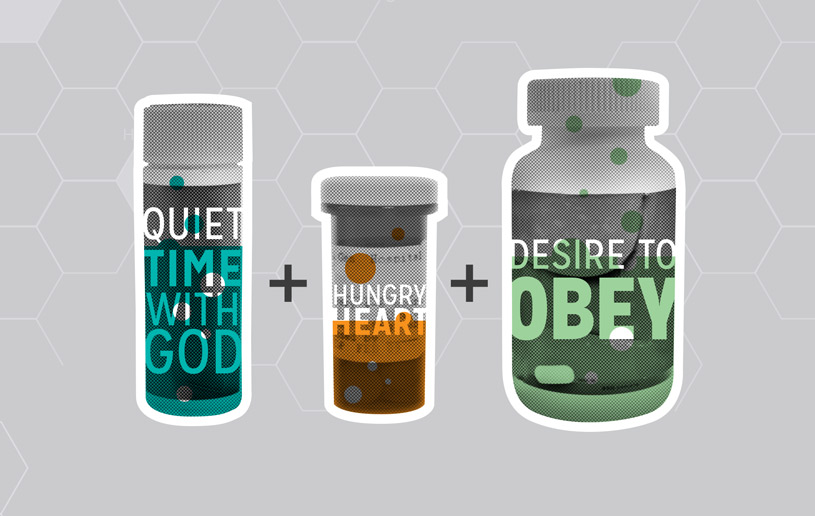
We hear a lot these days about the active ingredients in our medicines. These are chemical substances that actually make the medicine do what it is supposed to. For example, the active ingredient in Tylenol is the painkiller acetaminophen. The rest of the elements, like food colouring and corn syrup, are inactive ingredients carrying the active ingredient. Without it you can take all the Tylenol you want, but you’ll still have a headache.
This is called placebo—a pill with no active ingredients. To test the effectiveness of active ingredients in medicine people are given placebos. In some cases the perception that the medicine is real, called the placebo effect, improves the patient’s condition. The brain may actually bring about improved physiological effects, but there is nothing in the pill itself that heals.
There is an analogy here as it relates to personal time with God—often called devotions or quiet time. For some, devotions are like a placebo. People go through the motions but since there are no active ingredients, the effect is minimal. They may even think they are growing spiritually, but in reality there is little spiritual impact.
Along with many Christians I admit that my devotional times are hit-or-miss. It often seems too difficult to carve out time for Bible reading and prayer. And when I actually do, those times can be sterile and mechanical. I’ve told myself countless times I just need more discipline to make it part of my routine. For a while this works, but then routines are broken and I am back struggling with it.
Do devotional times in and of themselves result in a vital, healthy relationship with God? I have to say no. The Pharisees of Jesus’ day were steeped in the Word and spent much time praying, but Jesus still reserved His most scathing words for them.
Do we need devotional times at all then? I have to say yes. In the gospels, I see Jesus’ example of spending mornings and evenings apart from His disciples to commune with His Father.
Despite their devotion, Isaiah 29:13 was true of the Pharisees “—These people come near to me with their mouth and honor me with their lips, but their hearts are far from me. Their worship of me is made up only of rules taught by men” (NIV). What makes the difference between a vibrant personal time with God like Jesus had and a pharisaic religious exercise?
Using the above analogy I believe that devotional times are the inactive ingredient, the carrier of the active ingredient. And like Tylenol, you can have all the devotional time in the world, but without the active ingredient, you still come up with an empty religious exercise.
So what active ingredients in a personal time with God make it one that produces spiritual growth?
There are actually two active ingredients and both are heart issues. The first active ingredient is a heart that hungers and thirsts after the living God. The Psalmist wrote, “As the deer pants for streams of water, so my soul pants for you, O God. My soul thirsts for God, for the living God.” Then he asks, “When can I go and meet with God?” (Psalm 42:1–2). Many times I’ve recognized that I didn’t desire to meet with God because I didn’t thirst for Him. And when that has been the case I have prayed for the Lord to give me that longing after Him. Graciously, He does.
The second active ingredient is a heart that desires to actually live out the Christian life. When I move from a passive Christianity to one where I seek to think and live Christianly on a daily basis, then reading and prayer will happen. I won’t have to force it.
My devotional time changes when I actually try to fulfil the commands of Scripture. Taking my faith and relationship to God seriously moves personal time with Him from being a nice idea one can take or leave, to being a matter of necessity—needing Him in and for everything. As Jesus said, “…If a man remains in me and I in him, he will bear much fruit; apart from me you can do nothing” (John 15:5). We so easily forget how helpless we really are.
By writing this I don’t pretend to have consistently achieved a personal time with God that is always spiritually refreshing and beneficial. Perhaps I have only diagnosed my problem more accurately. But in my case, that is the first step to making sure I have the active ingredients.

